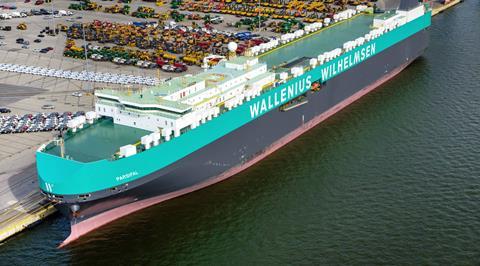
European-based ocean car carriers are responding to the impact of the coronavirus on the automotive industry with fleet reductions and reduced sailings, as well as working around restrictions being put in place globally at ports of call.
The ocean-side division of Wallenius Wilhelmsen’s car carrying business (WW Ocean) is to reduce its fleet of around 125 vessels by up to 15 in the wake of car plants closing down, automotive supply chains being interrupted and coronavirus-related disruption to normal business activity looking set to continue for months.
The Norwegian shipping line specialises in distributing cars, trucks, rolling equipment and breakbulk to customers all over the world.
“The current situation indicates an overcapacity in the Wallenius Wilhelmsen fleet of 10 to 15 vessels,” the group said in a stock exchange filing. “This will be solved through a combination of redelivery of chartered vessels to tonnage providers, early recycling and cold layups.”
Up to four vessels, all 24 years or older, will be recycled, with WW saying: “In a market that already has some overcapacity, we do not expect that these vessels will be needed in the foreseeable future.”
The recycling will cost the company up to $40m, while the cold layup will save between $3,000 and $4,000 a day.
Two vessels under construction will be delayed because the disruption Covid-19 is causing, while to preserve cash, capital expenditure is being reduced to a minimum, with some large land-based expansion projects deferred and cancellation of four of the remaining scrubber installations.
In the stock exchange filing, WW said: “We are making these decisions now, to ensure that we quickly can adjust service and costs as the supply chain and market impacts become clearer.”
The company also commented: “We see that both frequency and lead-time will be impacted but together with customers we will work hard to keep operations going the best way possible. In these uncertain times, trust and transparency will be crucial to minimising disruptions.”
Though the situation is improving in Asia, WW Ocean noted that matters were escalating in Europe and the US, with car plants shutting down, borders closing, and supply chains being hit hard.
President and CEO Craig Jasienski said: “The world has changed dramatically over the past weeks, and we are all feeling the effect. The impact these events will have on the world economy and global supply chains remains unpredictable, but it is increasingly clear that current events will have longer term impacts.”
Rapidly changing picture
Among other vehicle-transporting shipping lines, UECC said: “We will continue to operate our network as long as there is sufficient cargo, but with reduced sailing frequency. As there are changes from hour-to-hour, it is difficult to issue a new complete fleet schedule. However, we are working on this and will do this as soon as possible.”
The Norwegian company’s director of sales and marketing Bjorn Svenningsen said directly to customers: “If you have any needs for any irregular shipments as a result of this crisis, please let us know. Let’s support each other during this challenging time!”
In a March 24 message to clients, Thor Jørgen Guttormsen, CEO of Norway-based Höegh Autoliners, said: “At this time, all the ports that we call are operational. However, many are putting in place extra restrictions. Our team is closely monitoring the rapidly evolving situation and are working around the globe to find solutions to keep our operations running as smoothly as possible.”
Italy’s Grimaldi Group said it had not planned any cancellation of departures as of March 18.
All companies emphasised they were taking measures, such as implementing biosecurity on board ships and stopping face-to-face meetings, to counter the spread of coronavirus.

























![Global[1]](https://d3n5uof8vony13.cloudfront.net/Pictures/web/a/d/s/global1_726550.svgz)













No comments yet